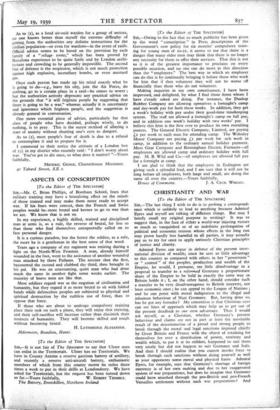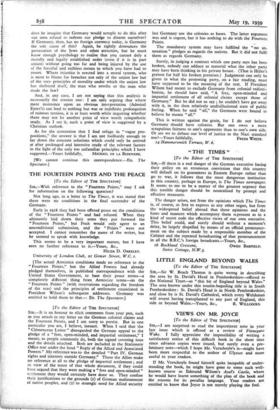CHRISTIANITY AND WAR
[To the Editor of THE SPECTATOR] Sta,—The last thing I wish to do is to prolong a correspond- ence which is unlikely to lead to anything because Admiral Eyres and myself are talking of different things. But may I briefly recall my original purpose in writing? It was to suggest that, in the face of either a world-war injuring victors as much as vanquished or of an indefinite prolongation of political and economic tension whose effects in the long run may prove hardly less harmful to all parties, it may actually pay us to try for once to apply seriously Christian principles of justice and charity.
Admiral Eyres can argue in defence of the present inter- national division of wealth; since he sees so little advantage to this country as compared with others in her " possession " or " control" of the peoples, production and wealth of the Empire, he would, I presume, see little disadvantage in a proposal to transfer to a reformed Germany a proportionate share of the Empire to be held in exactly the same way as Britain holds it ; I, on the other hand, should consider such a transfer to be very disadvantageous to British interests, not least economic ones ; he can appeal to the League of Nations ; and he can point with moral indignation to the illegal and inhuman behaviour of Nazi Germany. But, having done so, has he got any forrader? My contention is that Christian eyes can see lines of approach which may help us to get out of the present deadlock to our own advantage. Thus I would ask myself, as a Christian, whether Germany's present behaviour and claims are not in part at least the inevitable result of the determination of a proud and strong people to break through the moral and legal sanctions imposed chiefly by Great Britain and France with the object of retaining for themselves for ever a distribution of power, territory and wealth which, to put it at its mildest, happened to suit them very nicely but did not happen to suit Germany and Italy. And then I should realise that you cannot invoke force to break through such sanctions without doing yourself as well as your opponents some moral and physical harm. Admiral Eyres, for example, says that Germany's shortage of foreign currency is of her own making and due to her exaggerated system of war preparations, but does he imagine that Germany could have smashed through the pro-British and pro-French Versailles settlement without such war preparations? And does he imagine that Germany would scruple to do this after our own refusal to redeem our pledge to disarm ourselves? If Germany, then, has no foreign currency today, is Germany the sole cause of this? Again, he rightly denounces the persecution of the Jews and other atrocities, but he must know enough psychology to realise that you cannot defy a morally and legally established order (even if it is in part unjust) without going too far and being injured by the use of the forceful and ruthless means to which you have had to resort. Where injustice is erected into a moral system, who is most to blame for breaches not only of the unjust law but of the very principles of morality under which the unjust law has sheltered itself, the man who revolts or the man who made the law?
And, in any case, I am not saying that this analysis is necessarily the correct one: I am only arguing that where mere insistence upon an obvious interpretation (Admiral Eyres's) can lead to nothing but war or indefinite prolongation of ruinous tension, it is at least worth while inquiring whether there may not be another point of view worth sympathetic study. As I see it, such a point of view is suggested by a Christian outlook.
As for the contention that I find refuge in "vague pro- positions," the answer is that I am not foolhardy enough to lay down the concrete solutions which could only be arrived at after prolonged and intensive study of the relevant factors in the light of the only too unfamiliar principles which I have
[We cannot continue this correspondence.—En. The Spectator.]



















































 Previous page
Previous page